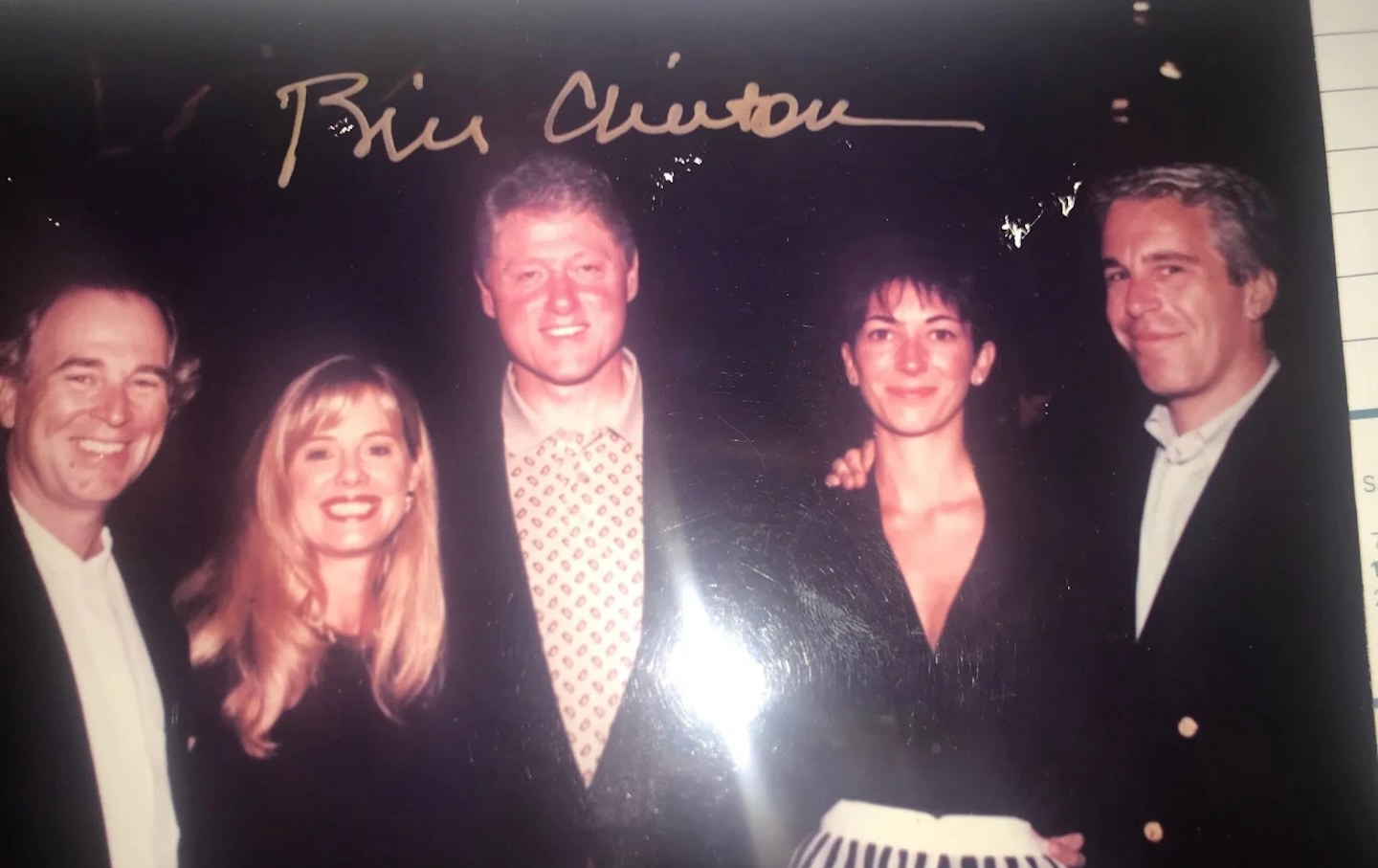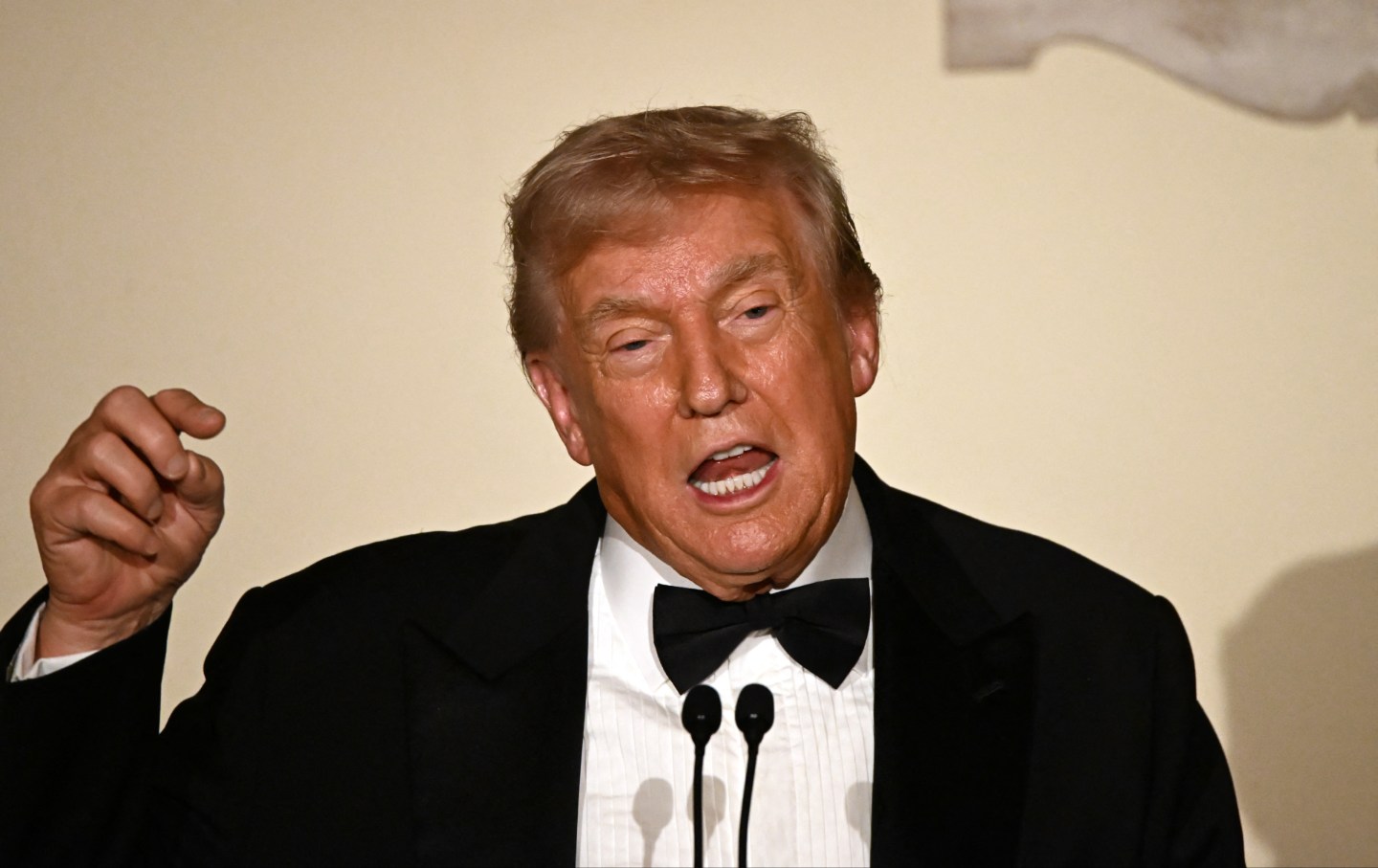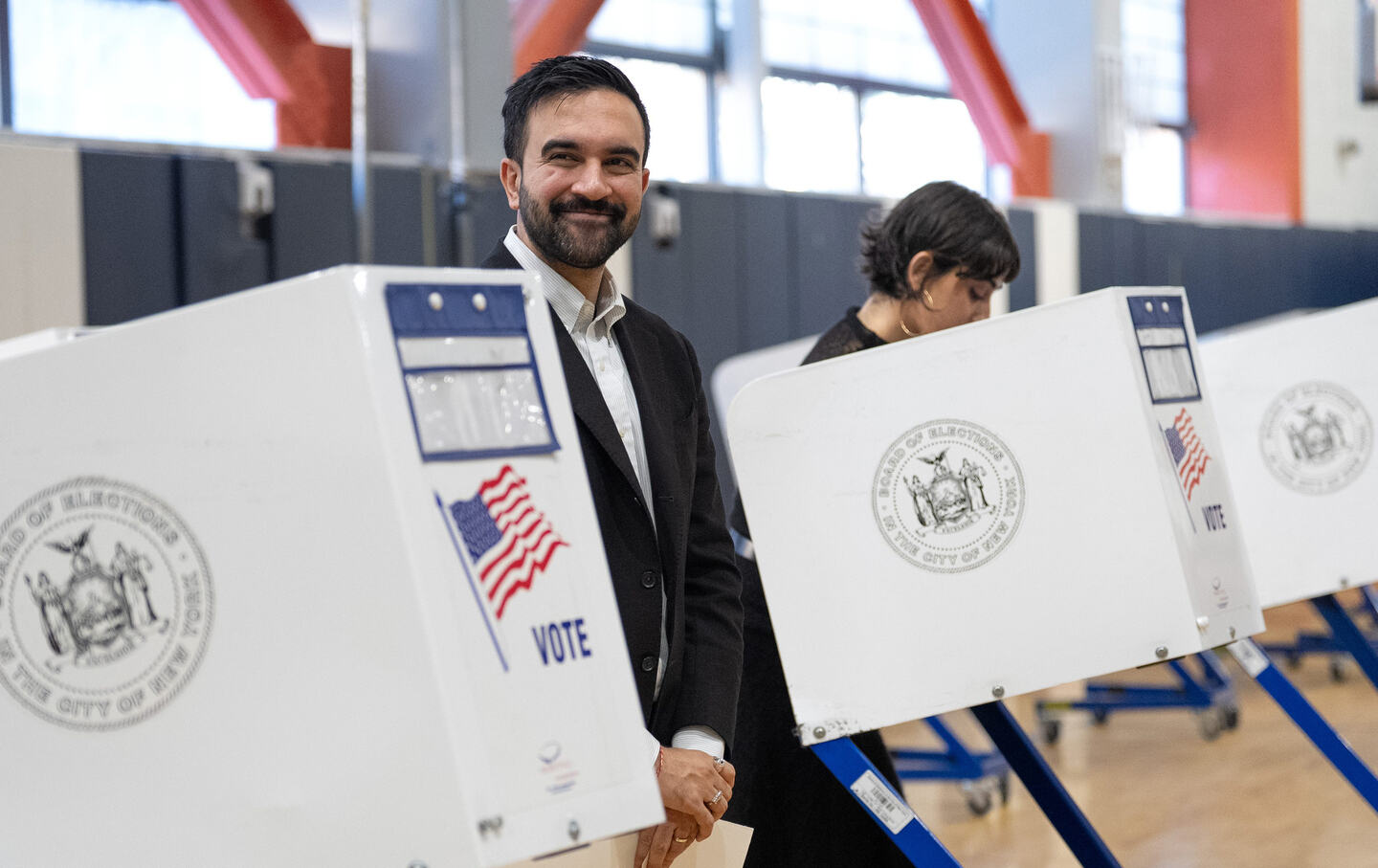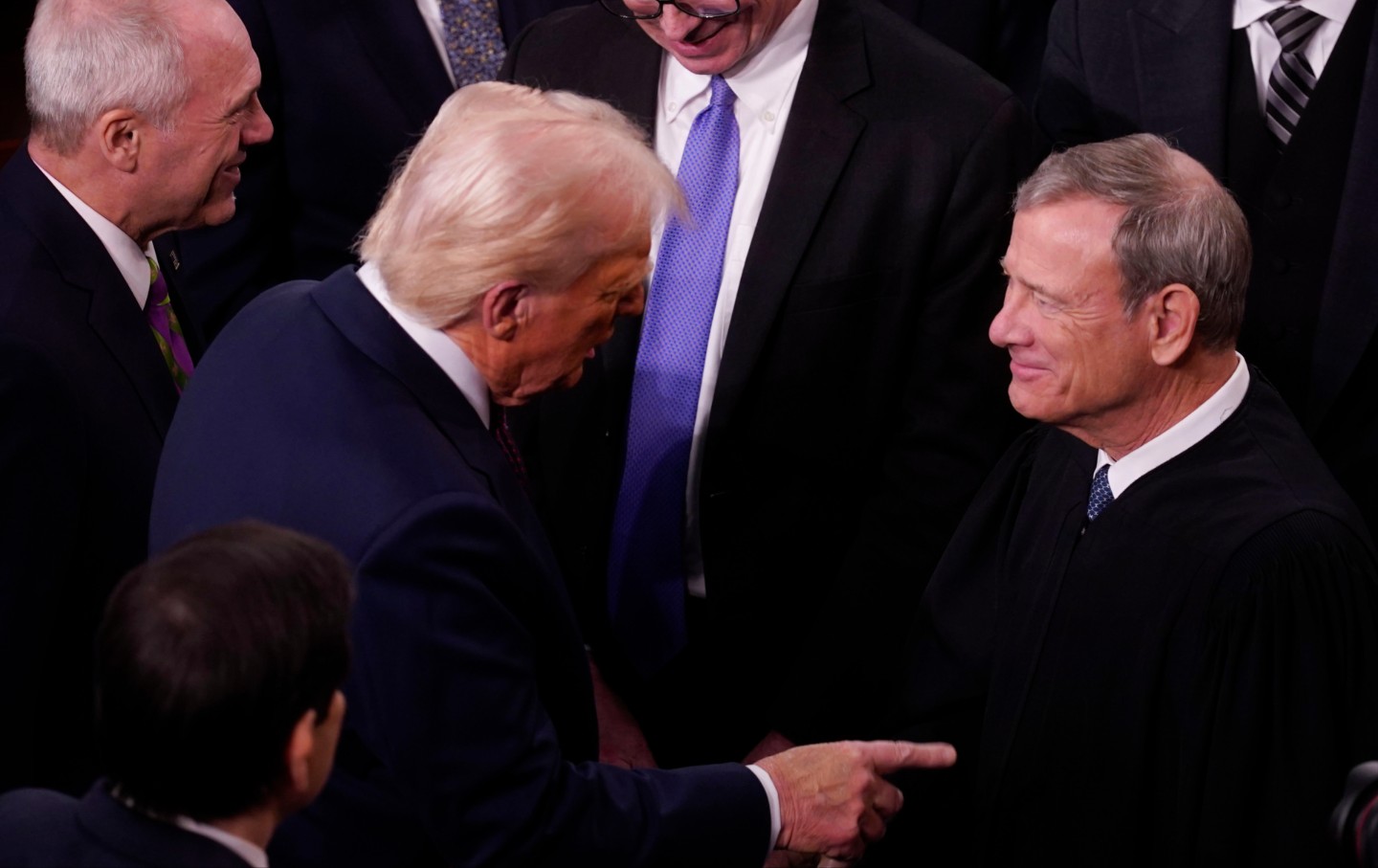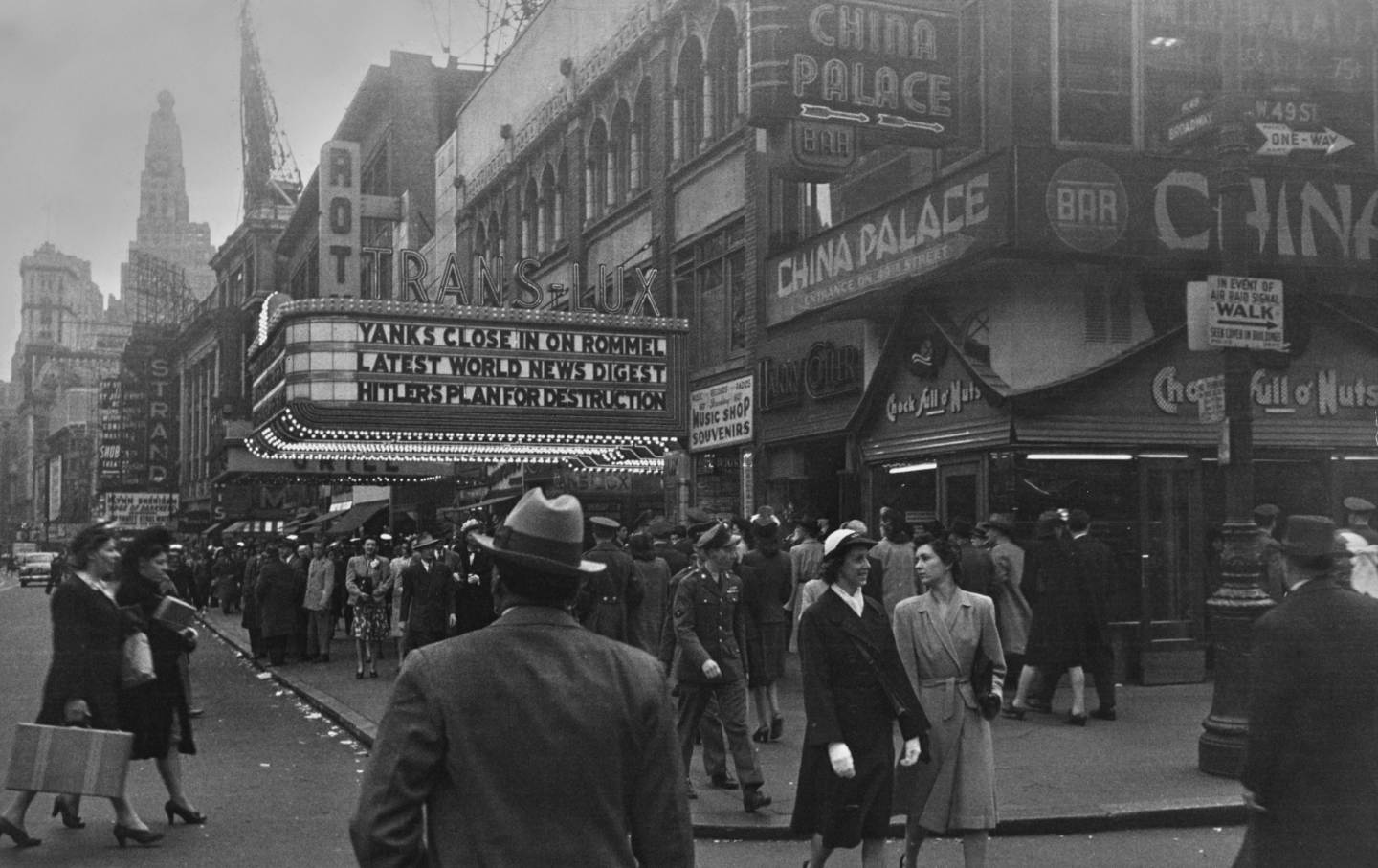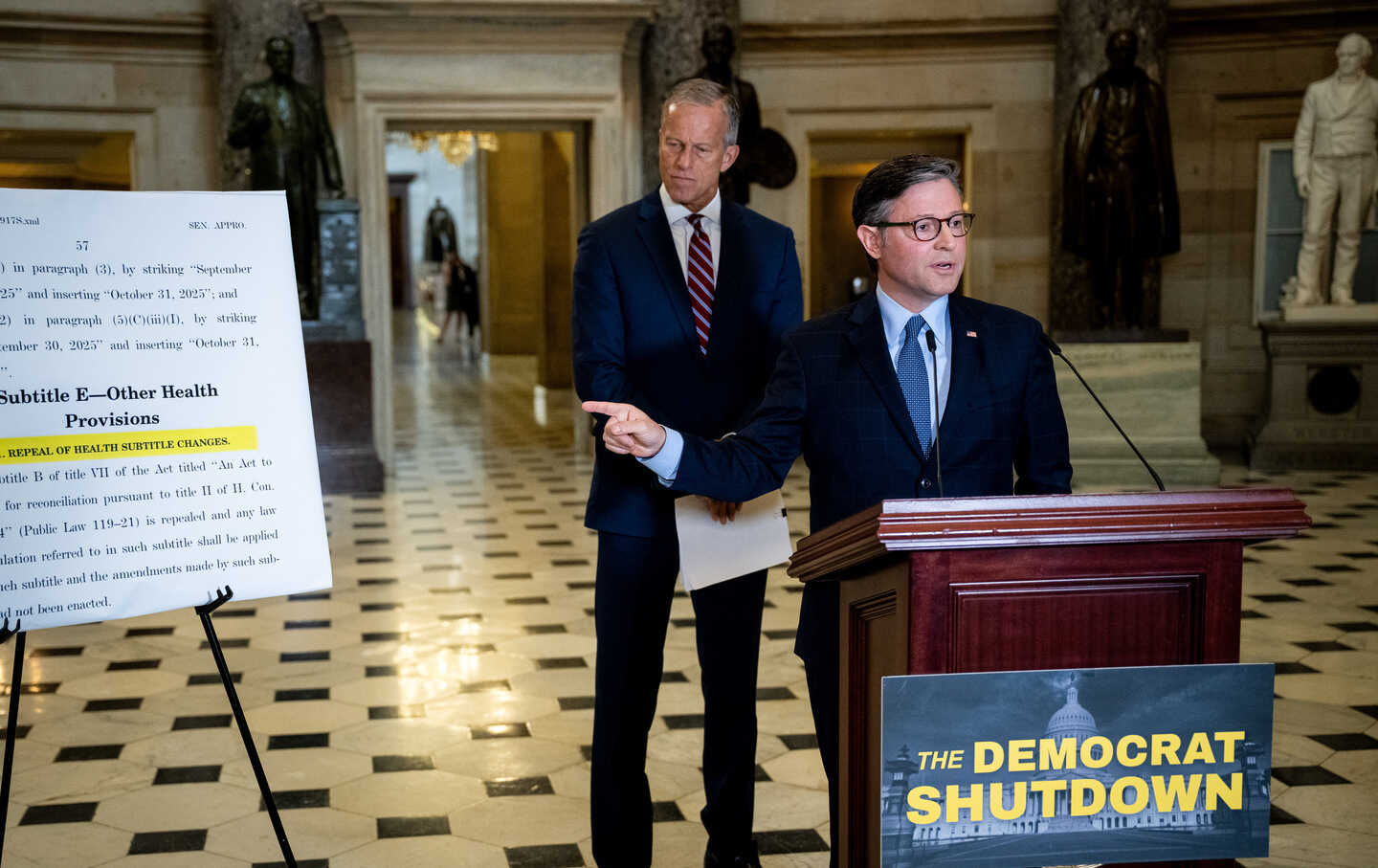How to Balance the Supreme Court
On this episode of Contempt of Court, legal experts Dan Epps and Steve Vladeck discuss ways to find the balance in our highest court.

Here's where to find podcasts from The Nation. Political talk without the boring parts, featuring the writers, activists and artists who shape the news, from a progressive perspective.
Beyond raw court expansion, or the (probably unconstitutional) big stick of forced term-limits, there are a number of other ways one might go about balancing the Supreme Court.
On this episode of Contempt of Court, Elie Mystal speaks with legal experts Dan Epps and Steve Vladeck about potential ways we might find that balance.
Our Sponsors:
* Check out Avocado Green Mattress: https://avocadogreenmattress.com
Advertising Inquiries: https://redcircle.com/brands
Privacy & Opt-Out: https://redcircle.com/privacy
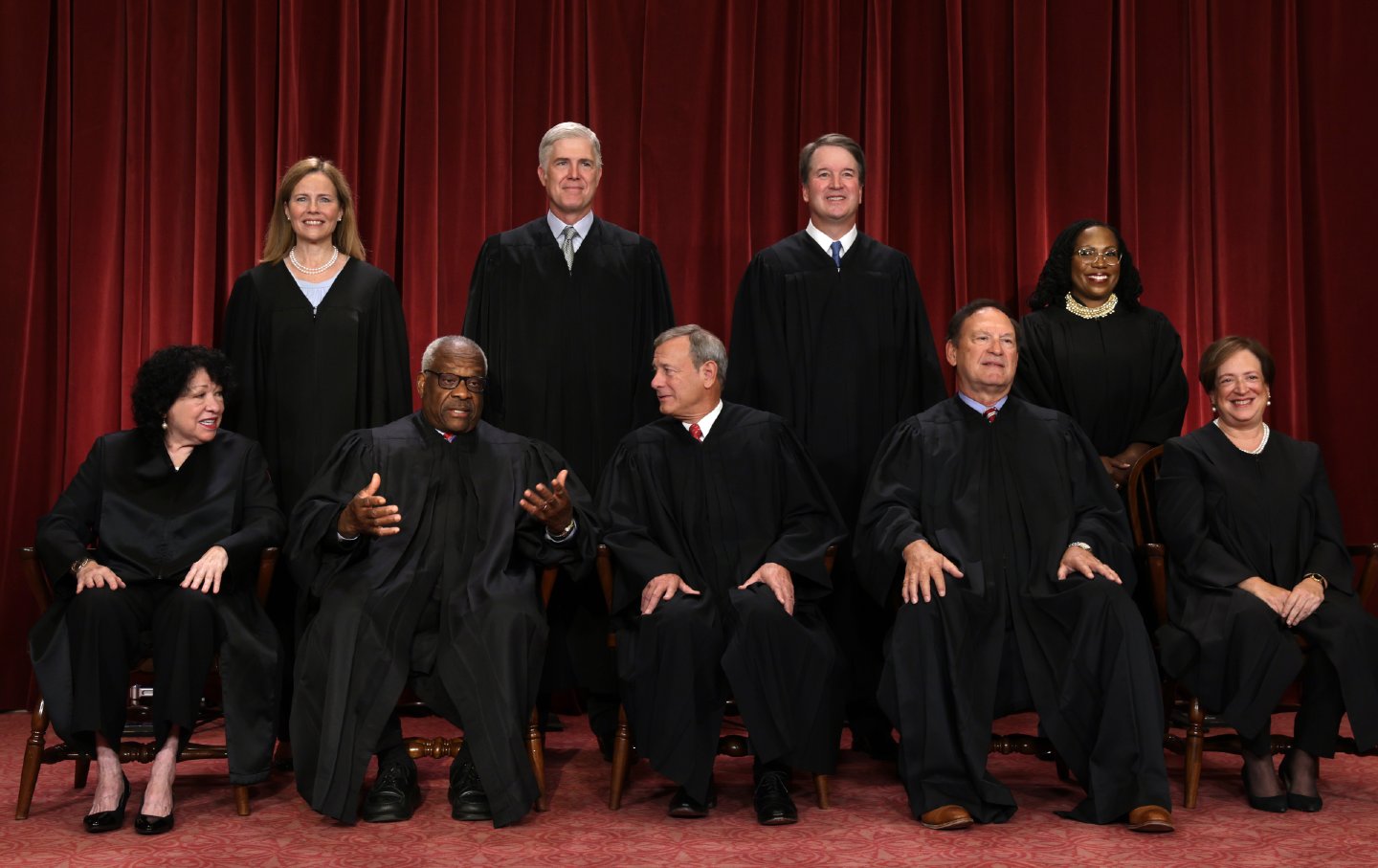
Beyond raw court expansion, or the (probably unconstitutional) big stick of forced term limits, there are a number of other ways one might go about balancing the Supreme Court.
On this episode of Contempt of Court, I spoke with legal experts Dan Epps and Steve Vladeck about potential ways we might find that balance.
[00:00:00] Elie Mystal: Cards on the table. I wanted Elizabeth Warren to be president. I would’ve voted for her in the primary, had the process not been perfunctory by the time the primary rolled around to late ass New York state. But I of course voted for Joe Biden in the general election. And I spent a lot of time on television and Twitter defending Kamala Harris, both during the primary and after she was named Biden’s Running Mate.
[00:00:32] But the 2020 candidate I spent the most time writing about promoting and generally encouraging people to take seriously was the former mayor of South Bend, Indiana, Pete Buttigieg. I could spell his name before most people could pronounce it. And the reason was simple. Mayor Pete was the only Democratic candidate who made court reform a major part of his presidential platform, Buttigieg and only Buttigieg made balancing the court a central part of his campaign.
[00:01:11] I had to support him and his efforts, and I don’t even like his plan. Let’s talk about it.
[00:01:21] Welcome to Contempt of Court, a podcast from the Nation sponsored by the New Press. I am Ellie Masal, the Justice Correspondent for the Nation.
[00:01:32] Beyond raw court expansion or the probably unconstitutional big stick of forced term limits. There are a number of ways one might go about balancing the Supreme Court so that it stops issuing ridiculous opinions.
[00:01:50] There are incremental steps and marginal improvements that could make the court not so much less partisan, but less extreme. There are steps we could take that would restore public confidence in the court and the appearance of fairness.
[00:02:11] Now, generally, I’m not in favor of plans that prop up this court.
[00:02:17] I’m not interested in giving this court a quickening instead of feeding these vampires a regulated diet of donated blood. I’d rather burn the motherfuckers out, but, many people are interested in saving the court from itself. One of those people is Pete Buttigieg. He didn’t want to blow up the court. He wanted to moderate it and save it from its worst instincts.
[00:02:44] Of course. Much as I love Mayor Pete’s focus on the issue, it wasn’t his plan. Buttigieg did what a lot of smart people do. He read other smart people and adopted their ideas. So I talked with one of the people who wrote the plan that Buttigieg promoted.
[00:03:03] Washington University School of Law in St. Louis professor Dan Epps.
[00:03:08] Hey, Dan, it’s great to have you on the show. You clerked for Justice Kennedy in 2009, 2010, and he was really one of those justices who didn’t always go where you expected him to go. And you know, one of my criticisms about Barack Obama’s suggestion of Merrick Garland in 2016 was that I don’t know how Merrick Garland is gonna vote in every case.
[00:03:32] Given what Republicans are doing with the Supreme Court, I need a justice where we know how they’re gonna vote in every case. So in your plan, you and Ganesh promulgate the idea that would ensure that some justices like Kennedy, like Garland, like Steven Briar, like John Paul Stevens, some of these justices whose votes you can’t count on, or either party can’t count on, would still be represented on the court.
[00:03:59] So kind of explain a little bit about what your balanced bench or 5, 5, 5 Plan actually tries to do, and operationally how it does it.
[00:04:08] Dan Epps: Yeah. And so, uh, the way you summarized it, I think is, uh, exactly right. So I think, um, –in terms of the motivation, um, and then I’ll get into the details– we were sort of thinking, look, how can we construct a system that, uh, structurally kind of produces justices who are not just pure partisans?
[00:04:27] Because once you have the pure partisanship, I, I really believe the whole thing starts to break down. And, you know, uh, And you could be fine with that. Um, our argument was like, you know, we, it does, it’s important to have a court. People have legitimacy, uh, faith in the law in some broader sense, but you can’t just have it be partisan.
[00:04:47] So we sort of said like, what would that look like? How would you change the system to, um, to to, to not make sure it’s all partisans. And we do it in kind of a, our proposal does it in kind of a wacky way. Um, and uh, the idea actually comes from an analog to, um, like civil arbitration, like between like, uh, investors and, you know, states and, you know, like two companies where, um, basically each side, um, gets to appoint like one arbitrator.
[00:05:19] So there’s two, one appointed by each side. Then they’re each one, we know exactly how they’re gonna vote, but then those two have to agree on somebody else. Right. And that person is actually the decider. Um, and I sort of said, you know, we sort of said like, what if, how would you, like, that’s kind of not a crazy system where you ensure that like the person who’s actually making the decision is kind of fair and everybody thinks they’re reasonable, uh, and so forth.
[00:05:42] And so we sort of said maybe we could harness, uh, partisan politics in a way to actually make the court less partisan. So you’d actually, um, we’d start with kind of, you know, five slots that are kind of allocated to, uh, Democrats in some way. You know, we don’t need to get into the weeds about how exactly to do that and five slots that are kind of allocated to Republicans in some way.
[00:06:06] Um, but then the justices. Those justices would have to kind of agree on who to kind of call up from the lower courts to kind of sit on the court with them. And those justices would kind of be the deciders in a lot of cases. And I think, you know, you can, you know, get into a lot of, you know, try to game it out.
[00:06:25] And maybe it would be more complicated than we say, but I, I think our idea was, You’re gonna get some people that are a little bit more like the Kennedys who are gonna be unpredictable, who are maybe, um, motivated, not just by the partisanship, um, but are kind of gonna, you know, take a more, uh, you know, kind of open-minded approach.
[00:06:44] I mean, I think one thing, um, that I’ve been thinking about recently is like kind of the role of the Supreme Court for, for quite some time. Um, maybe a lot of the 20th century was just to kind of stop states from doing crazy shit, right? Like, just like, not any one thing, but they’d just sort of be like, look what’s going to the south?
[00:07:03] This is, this is kind of crazy. You can’t really do that. Um, and now that we have, uh, a court that is much more rigidly partisan and rigidly, um, kind of at least, you know, seems to, the majority seems to think itself as kind of, it’s got the one right answer to all legal questions. There’s no flexibility to kind of like do what’s just, um, they’re not gonna stand in the way of states doing crazy shit anymore.
[00:07:31] Um, and uh, I think that’s a little dangerous. And, and that’s something to be scared of because like states are gonna do some crazy shit. We’re seeing that happen already. We’re seeing a bunch of, uh, Republican legislatures just saying, you know, let’s go hog wild. Like let’s just, uh, let’s do whatever.
[00:07:48] And they’re probably gonna let us get, get away with it. And I, I think our, you know, our hope was like a different kind of system might sort of hold that center together. And Yeah, I mean, of course, you know, like as you sort of implied and I think it’s totally fair. It’s like the Kennedy clerk is like, how do we like preserve the Kennedy court for all time?
[00:08:05] But I, I really do think that there was like, you know, having a Kennedy, having an O’Connor, having kind of a, a kind of reasonable, a person who’s not always just gonna be a partisan. I think that was good. I think that’s good, uh, for the court. I mean, I’d love to win every case, but I don’t think that that would necessarily be good.
[00:08:25] Um, in the long term for the law in the country,
[00:08:28] Elie Mystal: One of the reasons why I think the plan or, or the article was so fascinating is that to me it hits at one of the biggest problems with the Supreme Court. And that is not the Supreme Court justices themselves, and that’s gonna be shocking to some listeners.
[00:08:42] But trust me, I have lots of smoke for Supreme Court Justices themselves. But one of the biggest problems with the court is the confirmation process itself. And so in your plan, as you kind of explained, you have other justices picking the five, middle, moderate, however you wanna call them, justices, as opposed to the president and the Senate Majority leader, and whoever else gets a seat at the table.
[00:09:08] It fundamentally changes who gets to do the picking. Why did you decide to kind of focus on balancing the court while letting it retain its power as opposed to some of the other plans or some of the other reforms that would severely limit the power of the court, regardless of who was on it.
[00:09:27] Dan Epps: Yeah. And, and so I, I will say this is one thing that I struggle with and that I don’t like always.
[00:09:34] I, I think about this a lot and think about, you know, maybe we should do it differently. There’s a lot of other ways you could limit the court’s power. And so one other thing I guess I, I should have said earlier about like what is gonna motivate, what motivated our proposal? Part of it was, it was kind of like an invitation.
[00:09:51] To, uh, the other side to Republicans. You know, obviously we’re, didn’t, we try not to write it in a partisan way. We sort of wanna said, look, where this is going is not bad, is not good. And you all should agree with that too. And like, let’s figure out a solution before, uh, the crisis happens. Um, and no one, uh, took us up on that.
[00:10:08] Um, but you know, I, I do think, I, I think it was coming from a place of having that, uh, vision of the court as, yeah, maybe there is a role for, you know, the justices, you know, to kind of a group of people who are kind of just empowered to kind of like say like, Hey, is this, is this reasonable? Or is this thing that, you know, Texas did?
[00:10:30] Is it absolutely nuts? Um, and you know, the, the more you, um, disempower them, I mean, that necessarily means shifting power somewhere else. And so we have to decide where do we want to shift that power. Uh, in terms of shifting it to the states, I don’t know. I mean, that’s in terms of who, who that’s good for, who that’s bad for.
[00:10:54] I think it’s actually quite, uh, indeterminate because there’s, you know, Some, uh, conservative states who wanna do, uh, really conservative stuff and some blue states that wanna do liberal stuff. Um, and so, you know, we, we thought, you know, there still is a role for, um, the court to come in and say, you know, you can’t, you know, you can’t punish people for speaking in this way.
[00:11:17] You can’t do stuff like that.
[00:11:19] Elie Mystal: Um, I wanna start to transition a little bit away from the theory, um, of how to rebalance the court to the political realities of how that needs to happen. And so to start that kind of, uh, tangent, uh, the first thing I need to ask you is how did you get Pete Buttigieg on board with your plan?
[00:11:37] Because I know a whole gang of people who would love to have a presidential candidate even mention their plan much less and just read their plan, much less endorse it in a presidential primary. So like, how did that happen? How did you guys hook up?
[00:11:53] Dan Epps: Um, well, so, uh, unfortunately it’s gonna be a disappointing answer, which is that I think he read it.
[00:11:58] Uh, you know, I’ve actually never had any conversations with Mayor Pete about this. Never met him, never talked him on the phone. Um, he, he went to college with my co-author and I think, uh, Ganesh was kind of on his radar. Um, and, you know, he saw the article and, you know, he was more likely to read it ’cause he knew and respected one of the authors.
[00:12:17] And, um, You know, picked it up. And I think he’s a very savvy politician, and I think he, you know, he did a kind of similar, you know, where’s the puck going, uh, move. Um, which he was recognizing that, you know, uh, people are gonna start really thinking, uh, about, you know, really worrying about the problems with the court.
[00:12:36] And, you know, he’s, he’s a little bit more of a kind of moderate technocrat. And I think our approach, um, appealed to him. Uh, for that, for that reason, uh, in the sense that it was not a kind of burn it all down, not a, you know, pack the court kind of approach. Um, and, but I think he was, he was, you know, smart, uh, not to pick our plan, but just to say this court reform thing is gonna be a thing.
[00:13:00] Right. This is gonna be something people are talking about. Um, you know, he was, you know, I do think he was the first candidate to just start talking about that topic and by the end of the primary, everybody’s talking about it. Biden was having to talk about it even though he really, um, didn’t want to.
[00:13:15] Elie Mystal: I guess my question, Dan, is, Why don’t more politicians, especially on the Democratic side, see this as kind of a clear and present danger to, to their agenda?
[00:13:25] One of your recent, uh, uh, articles, one of some of your recent work, has really put into stark relief. Just how bad things are if we truly des decide that, that we’re gonna have nine justices forever. And let the natural course of, you know, hunting accidents and ham sandwiches determine what rights and responsibilities we live under.
[00:13:48] Dan Epps: Yeah, I mean, I, I mean, I do, you know, in terms of the premise of the question, I mean, I do think more of them are paying attention. Um, but to the extent that they’re not, uh, willing to, I mean, I think that it requires a willingness to kind of go against institutions, right? To, to make, uh, to not be an institutionalist, to agree that the system, the structure of government is broken in a certain way.
[00:14:11] And I think for people in Washington, um, there’s a hesitance, uh, to do that, right. They, you know, they, you know, if you’ve got, you know, even, you know, even if you’re, you know, kind of a more, uh, liberal senator, I mean, you, you know, the system has kind of worked for you. You got elected. Um, and I think, um, the kind of more, you know, being more people, being more in the direction of, uh, burn it all down, although I don’t think all.
[00:14:39] Uh, reform options are burn it all down. I think they’re systematically less likely to get, um, elected. Uh, and it may just be, but it may also just be, um, you know, that, that people don’t believe yet. Um, the people whose votes would matter the most don’t believe yet that it would be politically advantageous, that maybe we, they need the court to do worse stuff before they can really, uh, feel like they have the support to do that.
[00:15:06] Of course, the more the court does and the more the court kind of interferes with the electoral process, the harder it’s gonna be for Democrats to retain power.
[00:15:14] Elie Mystal: Dan, thank you so much, uh, for joining me today. Um, really appreciate the discussion and really appreciate your scholarship and work on this issue.
[00:15:20] Um, you are one of the more creative thinkers, um, about these issues and so I really appreciate your time today.
[00:15:26] Dan Epps: Thanks so much. This has been really good discussion.
[00:15:28] Elie Mystal: We probably won’t be locking in partisan balance on the Supreme Court anytime soon. But there are other things that we might do that would stop these six conservative justices from winning the cultural wars through legal fiat. There are other ways democratic leadership might fight back against the court if only they would realize we’re in a fight.
[00:15:54] I talked to University of Texas, Austin Law Professor Steve Vladeck, about how we might control what the justices are even allowed to do.
[00:16:05] If you don’t know Steve, he is, well, let’s put, let’s start, let’s start with this. Steve is my pick to replace anybody on the Fifth Circuit. Um, you could take any one of them, throw them out with the bath water and slot Steve in. He would be a much better choice, um, for that, overly conservative circuit. Somebody to bring a little bit of, of clarity and common sense to that circuit. He would be my pick for that. He’s the author of a new book, about the Supreme Court, specifically about how it. Takes cases and which, and, and the, the process by which it takes cases, colloquially known as the Shadow Docket, which is, some critically important work.
[00:16:42] So Steve, what we’re talking about today is really all of the other ways that one might go about regulating the Supreme Court. I wanna start with, um, talking about how a case even gets to the Supreme Court and, and, and which cases they decide to hear. So can you talk to us a little bit about just the kind of technocratic process of going from, you know, I’m a bigot with a cake shop to ending up in front of the Supreme Court.
[00:17:18] Steve Vladeck: So, you know, the Supreme Court for the most part is an appellate court, meaning, almost everything it does is hearing appeals from rulings of inferior, whether state or federal courts. It has a, a small chunk of what we call original jurisdiction, but that’s for, you know, a really, really tiny smattering of lawsuits between states that really are not what we’re worried about when we worry about the Supreme Court.
[00:17:43] Um, and the, the sort of, the dirty little secret is Congress has an awful lot of control over the Supreme Court’s appellate jurisdiction. And Congress exercised that control, at least for the court’s first 101 years, in a way that basically gave the justices zero discretion, um, over their docket. Congress basically said, here are the appeals you must hear, and these are the appeals you shall hear, and there’s no wiggle room.
[00:18:12] Like just do your job. Um, And, and what that meant is that, you know, the justices spent a lot of time, Ellie, on cases that they, you know, thought were beneath them. Um, right, because they weren’t necessarily high profile constitutional disputes. They weren’t cases where lower courts of divided, they did a lot of customs disputes and trade disputes and admiralty disputes.
[00:18:37] Um, And also what this meant was that by the 1880s, you know, on the far side of the Reconstruction amendments on the far side of Reconstruction, on the far side of the Civil Rights Acts of 1866 and 1871, 1875, when dockets of federal courts have exploded. Um, the Supreme Court is overwhelmed. It has like 1800 pending cases on its docket.
[00:18:59] So Congress’s response is to introduce first very gradually and then much more aggressively, um, what we now call Certiorari, um, the discretion that the justices have to pick and choose. Ellie, not just the cases that they hear, but the issues that they choose to resolve within those cases. Mm-hmm. What we call a limited grant of Certiorari, and this starts as an experiment in 1891 in four really small classes of cases that nobody cares about.
[00:19:28] Um, it expands a little bit in 1914. It expands dramatically in 1925, and then the brakes come completely off in 1988, where today. Um, the Supreme Court’s appellate docket is almost entirely discretionary. Mm-hmm. Um, the only appeals the Supreme Court must hear under the law today are appeals about certain campaign finance disputes, um, and a certain subclass of congressional reapportionment cases.
[00:19:59] And that’s it. Um, and everything else is the Justice’s choice. And I, I stress this even though it’s a technical point, and I tell this history in chapter one of the book, even though it’s like, seems like a strange place to start a book, um, because I think it’s, it’s critical in two respects. First, it’s critical in understanding how we got to a point where the Supreme Court has all the power it has today.
[00:20:20] Where the justices can basically sit back and pick and choose the issues they want to address in the cases they want to address them in. But second, we ought not lose sight of the fact that we only are in this reality because Congress chose to embrace it. Um, and what Congress giveth. Congress can taketh away.
[00:20:39] Elie Mystal: Steve, you bring up the, the critical point, uh, um, on, on Cert, I actually can’t pronounce Certiorari uh, uh, reliably. So I try to avoid the word.
[00:20:48] Steve Vladeck: I just, I just fake it.
[00:20:50] Elie Mystal: Um, um, but at a technical level, one of the biggest changes that we have seen, in our kind of modern, kind of post-Trump, uh, uh, uh, experiences, um, is when, uh, Anthony Kennedy retired, replaced by Brett Kavanaugh, because that then gave the hardcore conservatives four votes for Cert.
[00:21:16] Can you explain a little bit about why the number four on the Supreme Court is maybe even more important than number five?
[00:21:24] Steve Vladeck: Yeah, I mean, it’s even, I mean, they call it the rule of four, which is ironic because it’s not written down anywhere. Um, so, you know, Certiorari I, I, whether it’s four syllables or five is one of those great questions, um, was started as this experiment in 1891, and, you know, the court without any guidance from Congress just agreed internally that when it was exercising its discretion, it would be just less than a majority.
[00:21:49] So four votes out of nine. As you say, the, the number invites and begets all kinds of strategic behavior by everybody, by the justices, by litigants, by lower courts, so that the certiorari process itself becomes this highly technocratic and incredibly, um, politicized. Um, process where, you know, there are efforts to draw attention to lower court decisions, to get them to, to make them visible in the cert process.
[00:22:20] Um, where there are efforts to sort of create, you know, alignments for certiorari. And you mentioned that, you know, when Kavanaugh’s replaced, when Kavanaugh replaces Kennedy. Now you really do have four solid right votes for cert. The other part of the story is when Justice Barrett replaces Justice Ginsburg, right now you have a point of time where the Democratic appointees lack the ability to get any case onto the docket by themselves.
[00:22:47] Um, which is something we hadn’t seen in a very long time. So it’s, it’s, it’s sort of there, there are multiple valences here. The key is that this discretion, which is discretion, not just in the choice, but in the rules governing how the court makes the choice, discretion that Congress has never tried to regulate, um, empowers the court in all kinds of ways that are incredibly subjective that are incredibly strategic and that are subject to manipulation by all of the relevant stakeholders, um, in ways that help to get us to where we are today.
[00:23:20] Elie Mystal: Now, I’ve used this example on the show a couple of times and I’m gonna use it again because it’s, it’s, it’s one that I think, uh, most people can understand.
[00:23:27] If you look at how Dobbs actually happened. The, the case that overturned, um, Roe v. Wade when that first was, uh, uh, brought up on appeal. Um, what the, uh, the conservatives in Mississippi were asking for was simply for the court to uphold Mississippi’s 15 week ban on abortion. They weren’t asking the court to go all the way and overturn Roe v. Wade. Now in a world where Anthony Kennedy still exists and Brett Kavanaugh does not, it’s unlikely that that case would have even been heard by the Supreme Court because the Mississippi law was facially, the 15 week ban was facially violative of Roe v. Wade. And in a world where the conservatives don’t have four votes to get cert, it’s likely that the court simply doesn’t take the case up on appeal and the lower court ruling stands outlawing Mississippi’s ban and upholding Roe v. Wade. So this is an example of how litigants, as Steve was saying, who understand how the court works can literally bring kind of more aggressive, um, more conservative, um, more kind of earth shattering challenges simply by understanding how the court works and gaming the composition of the court at the time that they bring their cases.
[00:24:46] Um, Steve, the Supreme Court gets 7,000 appeals a year, somewhere north of that. Hears a hundred cases a year. If we don’t have the cert system, what’s the congressional solution, um, to this problem that doesn’t create its own other problem of, as you say, this all starts because the courts were overwhelmed a hundred years ago?
[00:25:13] Steve Vladeck: So I, I, I think the answer is everything in moderation Elie. Um, right. Which is, which is to say, um, I am not anti-Certiorari. I mean, and, and I think that comes through in the book, like, I think, you know, Yes, you have to have some mechanism by which the court cannot give the full nine yards of treatment right to every single one of these appeals.
[00:25:34] ’cause Ellie, I mean, you and I, I think, would agree that a large number of those appeals. Just aren’t worthy of the Supreme Court. Right. Right. The, the, the, you know, they’re not important questions. There’s no division. The lower courts faithfully apply the relevant precedents, what have you. Right. Um, so it seems like the problem is not Certiorari in the abstract.
[00:25:51] The problem is Certiorari preeminence. Um, and the extent to which Congress has gotten out of the business of saying that there are cases the court has to hear and you know, to me the blue sky right way to reconceive this is to have a meaningful public debate that the court ought to be involved in. It was involved in it historically.
[00:26:12] Mm-hmm. About the kinds of cases where we might actually want the Supreme Court to be forced to intercede. And I would also consider bringing back what actually was the norm for much of the 19th century, which is give the courts of appeals the power to put at least some cases on the court’s docket. Um, right.
[00:26:30] There was a period of time where one of the ways the court could hear a lower court decision was if the lower court judges quote certified their division. Um, and so you would actually have these cases where the, the two circuit judges back in the day where we had two circuit judges, would deliberately disagree with each other just to get the case up to the Supreme Court.
[00:26:49] Um, you know, some version of that where maybe like a majority of active judges on any one court of appeals can vote to require the Supreme Court to hear, you know, a particular dispute. Elie, we’re, we’re not, you know, we’re not all gonna agree on what the categories are, but I think that there are ways in which Congress could put back onto the court’s docket a broader array of disputes, um, that would one, take pressure off the emergency docket.
[00:27:16] Two, reclaim institutional control by Congress over the workload of the court. And three, and I think this is actually, you know, a sort of a subtle but important point, force the court to be a court. Um, you know, one, one of the problems of Certiorari is that when the justices can literally just hand pick the individual questions they wanna resolve and the individual disputes they’re resolving, they don’t look like a court.
[00:27:38] Um, versus, oh, hey, this case fell on us. We have to decide it like that’s, you know, that’s more consistent to me with what we think courts are supposed to do. So I’m not talking about 5,000 cases a year, but I don’t think it’s beyond the Supreme Court’s capability to handle 150. Um, and, you know, we don’t need to guess on that.
[00:27:57] As late as 1988, that was about the total of merit’s cases that the court was resolving each term.
[00:28:03] Elie Mystal: Steve Vladeck. The book is The Shadow Docket, how the Supreme Court Uses Stealth Rulings to Amass Power and Undermine the Republic. It is out now on in hardcover, wherever fine books are sold. Steve, thank you so much for joining me.
[00:28:18] Steve Vladeck: Thanks for having me. Elie,
[00:28:20] Elie Mystal: Balancing plans like the ones we’ve talked about today, come down to faith. For them to work, you have to believe that the judges appointed to the Supreme Court will act in good faith. You have to believe that the politicians in charge of the appointment process will act in good faith or at least be incentivized To pretend to act in good faith.
[00:28:42] You have to believe that the American people, at least most of us, will accept even handed fair-minded decisions, even if our personal political opinions sometimes lose.
[00:28:55] I believe none of that. I believe these plans could work in a better country, but our country is simply not evolved enough to handle it.
[00:29:08] These plans are like giving a chimpanzee tinned fruit and a can opener. Maybe it’ll figure it out, but most likely the chimp will just bash the can on a rock until the goo comes out. Republicans have won the court by using raw political power, and their justices are ruling the country with an iron fist.
[00:29:34] Republicans have essentially put an elephant on one side of the seesaw. You can’t balance that by putting a donkey in the middle and hoping for the best. You balance it by putting your own elephants on the other side, and if the seesaw breaks?
[00:29:53] Well, fuck your conservative playground equipment. It was trash anyway.
[00:30:01] Next week, we’re going to talk about why faith in the Supreme Court Justices is sorely misplaced, and talk about the desperate need for ethics reform to come to the most openly corrupt Supreme Court in American history. Contempt of Court is an original series from the Nation with support from the New Press.
[00:30:22] The show was produced by Babette Thomas, and executive produced by Ludwig Hurtado. Our original music was made by Ellington Peet.
Subscribe to The Nation to Support all of our podcasts
Disobey authoritarians, support The Nation
Over the past year you’ve read Nation writers like Elie Mystal, Kaveh Akbar, John Nichols, Joan Walsh, Bryce Covert, Dave Zirin, Jeet Heer, Michael T. Klare, Katha Pollitt, Amy Littlefield, Gregg Gonsalves, and Sasha Abramsky take on the Trump family’s corruption, set the record straight about Robert F. Kennedy Jr.’s catastrophic Make America Healthy Again movement, survey the fallout and human cost of the DOGE wrecking ball, anticipate the Supreme Court’s dangerous antidemocratic rulings, and amplify successful tactics of resistance on the streets and in Congress.
We publish these stories because when members of our communities are being abducted, household debt is climbing, and AI data centers are causing water and electricity shortages, we have a duty as journalists to do all we can to inform the public.
In 2026, our aim is to do more than ever before—but we need your support to make that happen.
Through December 31, a generous donor will match all donations up to $75,000. That means that your contribution will be doubled, dollar for dollar. If we hit the full match, we’ll be starting 2026 with $150,000 to invest in the stories that impact real people’s lives—the kinds of stories that billionaire-owned, corporate-backed outlets aren’t covering.
With your support, our team will publish major stories that the president and his allies won’t want you to read. We’ll cover the emerging military-tech industrial complex and matters of war, peace, and surveillance, as well as the affordability crisis, hunger, housing, healthcare, the environment, attacks on reproductive rights, and much more. At the same time, we’ll imagine alternatives to Trumpian rule and uplift efforts to create a better world, here and now.
While your gift has twice the impact, I’m asking you to support The Nation with a donation today. You’ll empower the journalists, editors, and fact-checkers best equipped to hold this authoritarian administration to account.
I hope you won’t miss this moment—donate to The Nation today.
Onward,
Katrina vanden Heuvel
Editor and publisher, The Nation

